
GRAMMAR REVIEW 47
Exercise 3: Determiners
C hoose th e correct d eterm in ers in th e follow ing sentences.
1. He doesn’t have (many/much) money.
2. I would like (a few/a little) salt on my vegetables.
3. She bought (that/those) cards last night.
4. There are (less/fewer) students in this room than in the next room.
5. There is (too much/too many) bad news on television tonight.
6. I do not want (these/this) water.
7. This is (too many/too much) information to learn.
8. A (few/little) people left early.
9. Would you like (less/fewer) coffee than this?
10. This jacket costs (too much/too many).
A AND AN
A or an can precede only singular count nouns; they mean one. They can be used in a general statement or to introduce a subject which has not been previously mentioned.
A baseball is round. (general—means all baseballs) I saw a boy in the street. (We don’t know which boy.)
An is used before words that begin with a vowel sound. A is used before words that begin with a consonant sound.
a book an apple
Some words can be confusing because the spelling does not indicate the pronunciation.
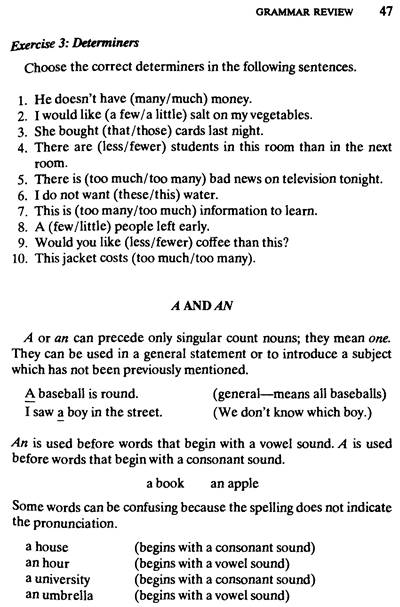 a
house (begins with a consonant sound) an hour (begins with
a vowel sound) a university (begins with a consonant sound) an umbrella
(begins with a vowel sound)
a
house (begins with a consonant sound) an hour (begins with
a vowel sound) a university (begins with a consonant sound) an umbrella
(begins with a vowel sound)
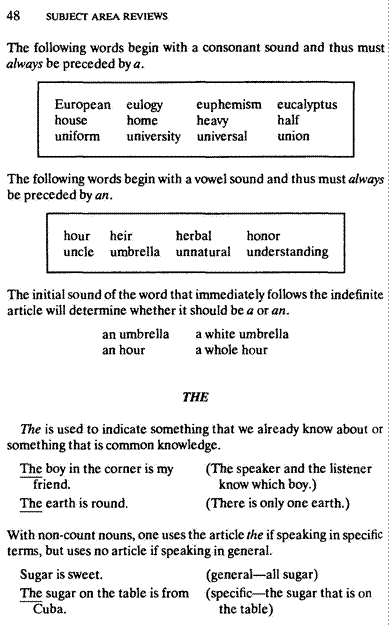
GRAMMAR REVIEW 49
Normally, plural count nouns, when they mean everything within a certain class, are not preceded by the.
Oranges are green until they ripen. (all oranges)
Athletes should follow a well-balanced diet. (all athletes)
Normally a proper noun is not preceded by an article unless there are several people or things with the same name and the speaker is
specifying one of them.
There are three Susan Parkers in the telephone directory.
The Susan Parker that I know lives on First Avenue.
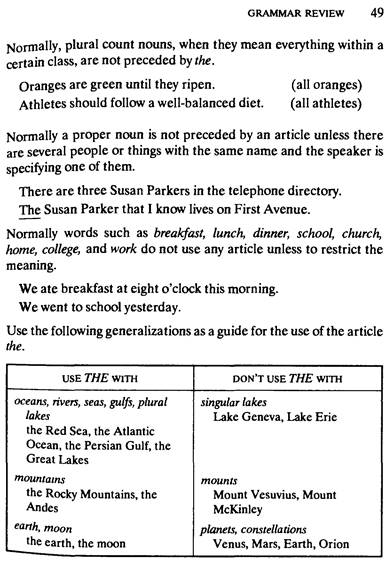 Normally
words such as breakfast, lunch, dinner, school, church, home,
college, and work do not use any article unless to restrict the
meaning.
Normally
words such as breakfast, lunch, dinner, school, church, home,
college, and work do not use any article unless to restrict the
meaning.
We ate breakfast at eight o’clock this morning.
We went to school yesterday.
Use the following generalizations as a guide for the use of the article the.
USE THE WITH don’t u se THE WITH
oceans, rivers, seas, gulfs, plural singular lakes
lakes Lake Geneva, Lake Erie the Red Sea, the Atlantic
Ocean, the Persian Gulf, the Great Lakes
mountains mounts
the Rocky Mountains, the Mount Vesuvius, Mount
Andes McKinley
earth, moon planets, constellations
the earth, the moon Venus, Mars, Earth, Orion
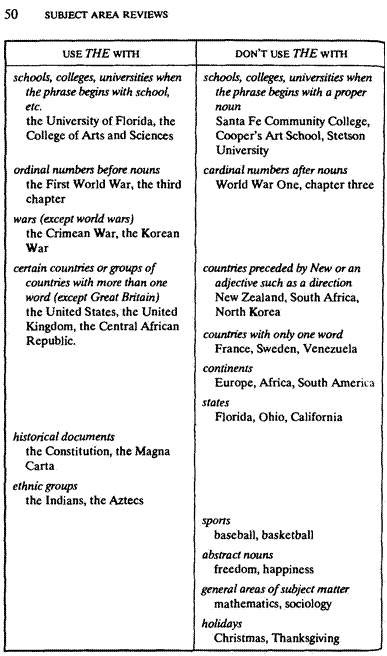
GRAMMAR REVIEW 51
Exercise 4: Articles
In the following sentences supply the articles (a, an, or the) if they are necessary. If no article is necessary, leave the space blank.
1. Jason’s father bought him ____ bicycle that he had wanted for his birthday.
2. _____ Statue of Liberty was a gift of friendship from _____ France to _____United States.
3. Rita is studying_____English and_____ math this semester.
4. ____ judge asked_____witness to tell_____ truth.
5. Please give m e_____cup o f_____ coffee with_____ cream and ____ sugar.
6. _____big books on _____ table are for my history class.
7. No one in _____Spanish class knew_____ correct answer to _____Mrs. Perez’s question.
8. My_____car is four years old, and it still runs well.
9. When you go to _____store, please buy_____ bottle o f _____ chocolate milk and_____dozen oranges.
10. There are only____ few seats left for_____ tonight’s musical at _____university.
11. John and Marcy went to _____ school yesterday and thenstudied in_____library before returning home.
12. -------Lake Erie is one of_____five Great Lakes in_____ North America.
13. On our trip to _____Spain, we crossed_____ Atlantic Ocean.
14. ------ Mount Rushmore is the site of______ magnificent tribute to _____four great American presidents.
15. What did you eat for_____breakfast this morning?
16.
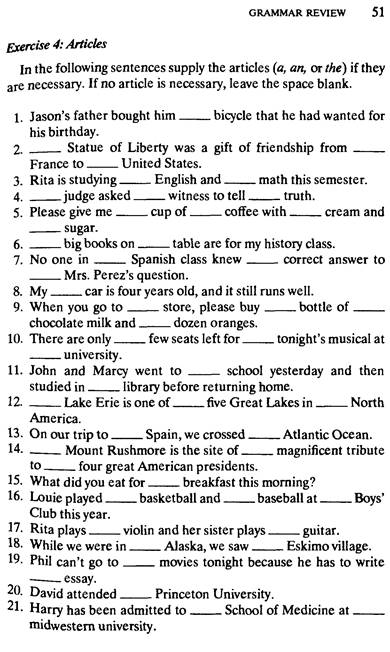 Louie
played_____basketball and_____ baseball a t_____ Boys’ Club this year.
Louie
played_____basketball and_____ baseball a t_____ Boys’ Club this year.
17. Rita plays____ violin and her sister plays______ guitar.
18. While we were in_____Alaska, we saw_____ Eskimo village.
19. Phil can’t go to _____movies tonight because he has to write
------ essay.
20. David attended_____Princeton University.
21. Harry has been admitted to _____School of Medicine a t_____ niidwestem university.
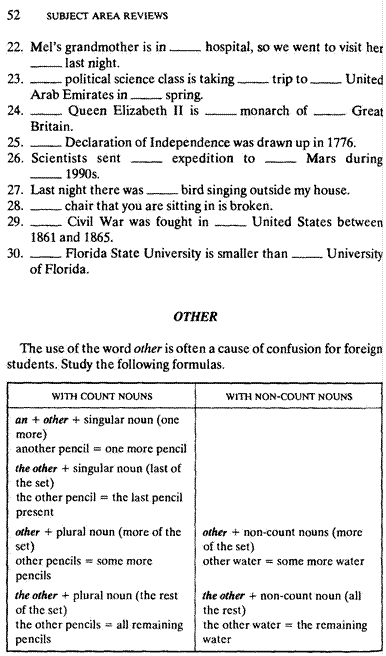
GRAMMAR REVIEW 53
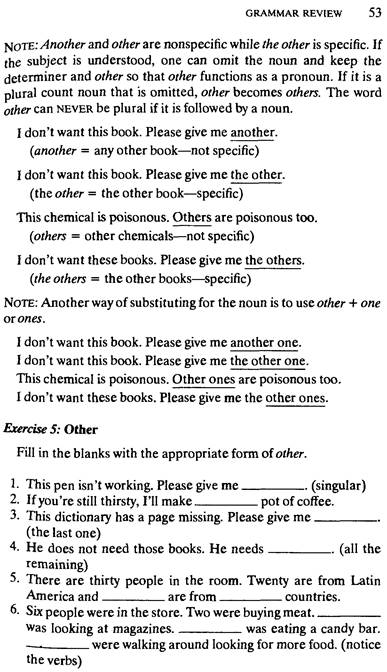 Note:
Another
and other
are nonspecific while the
other is specific. If the subject is understood, one can omit
the noun and keep the determiner and other so that other functions as a pronoun. If it is a
plural count noun that is omitted, other becomes others. The word other can n e v e r be plural if it is
followed by a noun.
Note:
Another
and other
are nonspecific while the
other is specific. If the subject is understood, one can omit
the noun and keep the determiner and other so that other functions as a pronoun. If it is a
plural count noun that is omitted, other becomes others. The word other can n e v e r be plural if it is
followed by a noun.
I don’t want this book. Please give me another.
(another = any other book—not specific)
I don’t want this book. Please give me the other.
(the other = the other book—specific)
This chemical is poisonous. Others are poisonous too.
(others = other chemicals—not specific)
I don’t want these books. Please give me the others.
(the others = the other books—specific)
Note: Another way of substituting for the noun is to use other + one or ones.
I don’t want this book. Please give me another one.
I don’t want this book. Please give me the other one.
This chemical is poisonous. Other ones are poisonous too.
I don’t want these books. Please give me the other ones.
Exercise 5: Other
Fill in the blanks with the appropriate form of other.
1. This pen isn’t working. Please give m e__________(singular)
2. If you’re still thirsty, I’ll make_________ pot of coffee.
3. This dictionary has a page missing. Please give m e__________(the last one)
4. He does not need those books. He needs__________ (all the remaining)
5. There are thirty people in the room. Twenty are from LatinAmerica and_________ are from __________ countries.
6. Six people were in the store. Two were buying meat__________was looking at magazines.__________was eating a candy bar. —-_______ were walking around looking for more food, (notice the verbs)
7. This glass of milk is sour__________ glass of milk is sour too.
8. The army was practicing its drills. One group was doing artillerypractice.__________was marching;__________ was at atten
tion; and_________ was practicing combat tactics.
9. There are seven students from Japan__________ are from Iran, and__________are from__________ places.
10.We looked at four cars today. The first two were far too expensive, but__________ones were reasonably priced.
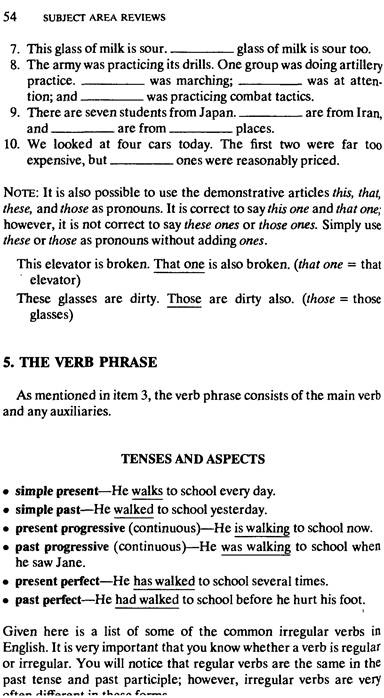 Note:
It is also possible to use the demonstrative articles thừ, that, these,
and those as pronouns. It is correct to say this one and that one; however, it is not correct to
say these ones or those ones. Simply use these or those
as pronouns without adding ones.
Note:
It is also possible to use the demonstrative articles thừ, that, these,
and those as pronouns. It is correct to say this one and that one; however, it is not correct to
say these ones or those ones. Simply use these or those
as pronouns without adding ones.
This elevator is broken. That one is also broken, (that one - that elevator)
These glasses are dirty. Those are dirty also. (those = those glasses)
5. THE VERB PHRASE
As mentioned in item 3, the verb phrase consists of the main verb and any auxiliaries.
TENSES AND ASPECTS
• simple present—He walks to school every day.
• simple past—He walked to school yesterday.
• present progressive (continuous)—He is walking to school now.
• past progressive (continuous)—He was walking to school when he saw Jane.
• present perfect—He has walked to school several times.
• past perfect—He had walked to school before he hurt his foot.
Given here is a list of some of the common irregular verbs in
English. It is very important that you know whether a verb is regular or irregular. You will notice that regular verbs are the same in the past tense and past participle; however, irregular verbs are very
Материалы на данной страницы взяты из открытых источников либо размещены пользователем в соответствии с договором-офертой сайта. Вы можете сообщить о нарушении.